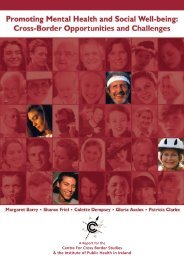improving government service delivery to minority ethnic ... - NCCRI
improving government service delivery to minority ethnic ... - NCCRI
improving government service delivery to minority ethnic ... - NCCRI
You also want an ePaper? Increase the reach of your titles
YUMPU automatically turns print PDFs into web optimized ePapers that Google loves.
Case Example 4 – Employment 110<br />
Business in the Community<br />
Business in the Community which describes itself as, ‘a unique movement in the UK and Ireland of over 750<br />
member companies’, has developed a voluntary code of practice on employing migrant workers/overseas<br />
staff in Northern Ireland. It is <strong>to</strong> this that O’Kane Poultry have signed up. The Code has been designed <strong>to</strong><br />
‘clearly identify a range of workers’ rights and employer’s responsibilities’. It states that the Code is not a legal<br />
obligation but a guide <strong>to</strong> ‘reinforce best practice in relation <strong>to</strong> the employment of migrant workers’. In addition <strong>to</strong><br />
this Business in the Community have a website also offering further advice and help <strong>to</strong> employers.<br />
Targeting: Education<br />
The Good Practice Guide for Racial Equality in Education 111 states that “over the past number of years<br />
concern has been expressed about the potential underachievement of children from black and <strong>minority</strong> <strong>ethnic</strong><br />
communities in Northern Ireland”. Connolly and Keenan 112 also found children from <strong>minority</strong> <strong>ethnic</strong> groups, and<br />
indeed their parents, had difficulties within the education system, mainly in terms of language barriers and lack<br />
of support with English as a second language.<br />
110_www.<br />
guide2migrantworkers.<br />
org.uk<br />
111_Equality Commission<br />
(2001) Racial Equality in<br />
Education A Good Practice<br />
Guide.<br />
112_Connolly, P and<br />
Keenan, M (2000)<br />
Opportunities for all.<br />
Minority <strong>ethnic</strong> people’s<br />
experiences of education,<br />
training and employment in<br />
Northern Ireland. NISRA.<br />
113_www.selb.org<br />
Discussions with the Belfast Education and Library Board (BELB) for this study indicated that funding restricts<br />
what can be done but that support is given for children learning English as an Additional Language (EAL). In<br />
addition it was highlighted that interpreters are available for parents during parent consultation evenings and<br />
that this <strong>service</strong> has been set up for a few years.<br />
Within the Southern Education and Library Board (SELB) there have been a number of initiatives put in place <strong>to</strong><br />
help children from <strong>minority</strong> <strong>ethnic</strong> groups and their parents. One example has been the development of a visual<br />
letter with the use of pictures and visuals as opposed <strong>to</strong> words thus appropriate for non-English speakers.<br />
However it was stressed by representatives of SELB that there was a need <strong>to</strong> develop more user-friendly<br />
documentation <strong>to</strong> enable increased communication with parents.<br />
Case Example 5 – Education (Primary and Secondary Level)<br />
North South Project – SELB and IILT 113<br />
SELB are involved in a North South project organised by Integrate Ireland Language and Training (IILT). The<br />
project aims <strong>to</strong> ‘explore how structural and management issues must be addressed in order <strong>to</strong> meet the<br />
educational needs from non-English speaking backgrounds; and <strong>to</strong> develop a <strong>to</strong>olkit <strong>to</strong> provide support for<br />
principals and teachers in addressing the language and learning needs of non-English speaking children in the<br />
primary classroom’.<br />
SELB highlight in their report a series of recommendations including:<br />
1. It is essential that budgetary provision has adequate flexibility so that the needs of schools, resulting from<br />
the arrival of newcomer pupils during the school year may be addressed appropriately; and<br />
2. There should be access <strong>to</strong> contingency budgets.
















